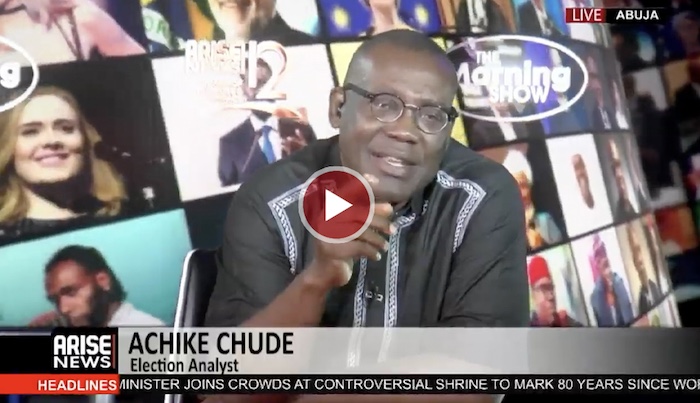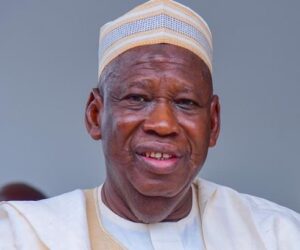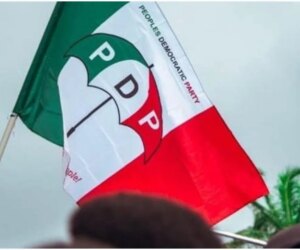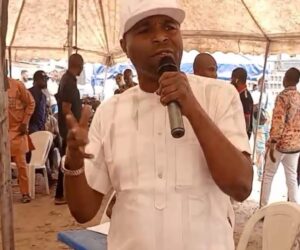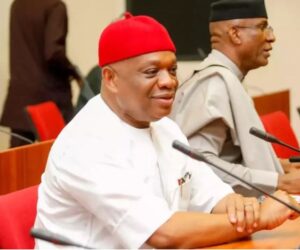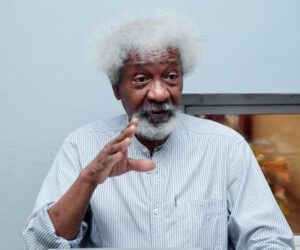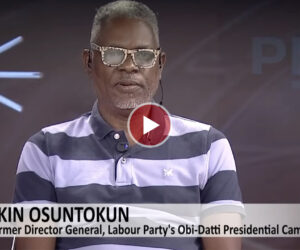
Political analyst Achike Chude has said that Nigeria’s Independent National Electoral Commission (INEC) carries the burden of restoring public confidence in the country’s electoral process, insisting that voters ‘have no point to prove.’
Chude in an interview with ARISE News on Saturday said Nigerian voters have nothing to prove, insisting it is INEC that must demonstrate credibility.
“The Nigerian voters do not have any point to prove. They have no point to prove. It’s INEC that has a point to prove,”
“If there’s voter apathy in this country today, if you can no longer mobilise enough people in each election cycle to participate in the process, then you will not blame the people, you will blame INEC.”
He warned that the 2023 elections had left a damaging legacy of disillusionment. “Voter expectation got to the peak, you know, and voter confidence in INEC grew to a very, very large extent. What happened during that process and after that process, I think, was a shock to a lot of Nigerians. It did not, that election did not meet the expectations of Nigerians. We just have to say it as it is. A lot of people were disappointed.”
Chude said while INEC and security agencies must shoulder responsibility for electoral failures, the greatest threat to Nigeria’s democracy remains the political class itself. “The biggest threat to the country is democracy. And the way I see it, having looked at the system and the politicians and the members of the political class, virtually all the divisions that are created in this country—the ethnic crisis, the ethnicisation of elections, infusing elections with religious bigotry and geopolitics—the masterminds of this are members of the political class. And they should be ashamed.”
He described staggering elections in Nigeria as an outcome of electoral malpractice and judicial interventions. “The staggering of elections, of course, you know that elections were, the way it was originally arranged, were supposed to be done on the same day, governorship and all that. But it is the malfeasance that happened within the system in many parts of the country at the level of governorship election that made it possible for us to have staggered elections. Obviously, in some instances, these electoral practices which involved the rigging of elections and all that led to the intervention of the courts.”
Chude explained that court rulings forced shifts in election calendars. “Once the courts intervened, it was inevitable that the calendar for such elections would also have to change, because in some instances they declared the occupier of some of the governing houses in the country as usurpers, people who were not supposed to be there in the very first place. And since a governor, for instance, the tenure of a governor is four years according to constitutional provisions, it meant that whoever came in much later or whose mandate was restored by virtue of an intervention of the courts had to start from the period that the new mandate started. And so that’s why you have staggered elections.”
Turning to Saturday’s by-elections across 12 states, he insisted that INEC had no excuse for failure. “This is not a large-sized election, this is a much smaller process. Just elections into two Senate seats, state assembly elections and federal constituencies. So if INEC does not get it right for this small thing, then it’s going to be quite a problem and an indictment on INEC. And they’ve had time to prepare, they’ve been talking about it for some time. And so we expect a stellar performance on the part of INEC.”
On security, Chude noted that the heavy deployment of personnel reflects poorly on Nigeria’s democracy. “After 25 years, 26 years of unbroken democracy, we are still having, for instance, for governorship elections, a deployment of 25,000, 35,000 security agencies. Then what are we talking about? You will think that with each subsequent election, Nigerians would have imbibed some democratic values and ethos. But all of these deployments you are seeing are being done because of the politicians. If the politicians decide to behave themselves, you don’t need all of this. Because the thugs who disrupt elections are usually motivated by financial rewards. Otherwise, they have no role in the fight.”
Chude also reacted to a recent Canadian court ruling describing Nigeria’s major parties, APC and PDP, as “terrorist organisations.” He said: “Those were very harsh words, and a very obvious indictment of the political system in this country, especially with regards to elections. But when international observers see cutlass-wielding people, sometimes people carrying guns up and down and shooting in broad daylight during an election, for a judge in Canada used to decency, this sounds terrorist. These are terrorist activities.”
He argued that Nigerian politicians must take responsibility for fueling violence. “Is this a political class that the court in Canada was referring to? A political class that would import people to cause mayhem in case the election did not go their way. It’s not a political class that loves this country. So we need to have a change of heart.”
Despite these concerns, Chude acknowledged the efforts of many within the electoral and security system. “I believe the authorities are doing their best. There are so many people within INEC, within the security forces that want this country to work, that want the elections to work. And I would say kudos to all of those people. Let them just continue. There is a struggle to get it right in this country. But we must not be accused of never playing any positive role in trying to get our country to be better.”
Boluwatife Enome
Follow us on:

